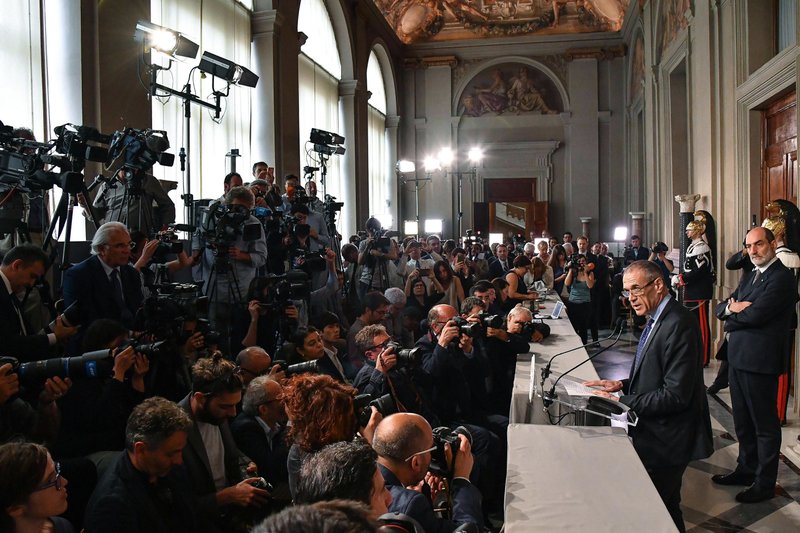ROME -- Italian populists vowed Monday to convert voter anger over their thwarted bid to govern for the first time into a kind of plebiscite on the European Union, financial markets and eurozone membership as the country found itself propelled to fresh elections as soon as late summer.
Amid the political turmoil, Carlo Cottarelli, an economist with International Monetary Fund experience, was asked by the Italian president to assemble a technocrat government to take the country to elections.
With weeks of political uncertainty taking a toll on Italy's bond and stock markets, Premier-designate Cottarelli said the return to the polls could come as early as after the August vacation break or, at the latest, at the start of 2019.
Only five days ago, another premier-designate, political novice Giuseppe Conte, stood in the same spot in the Quirinal presidential palace and declared he would work to create a "government of change" in what would have been Italy's -- and western Europe's -- first populist government.
That dream deflated dramatically Sunday night when President Sergio Mattarella refused to submit to populist demands that he approve their proposed economy minister, who in the past has recommended having a "Plan B" to exit the eurozone if EU strictures become too tight for Italy.
"This isn't democracy, this isn't respect for the popular vote," railed Matteo Salvini, a populist whose right-wing League was one of the anti-EU parties foiled by Mattarella. "It's just the last gasp of the strong powers who want Italy as a frightened, precarious slave."
"The next elections will be a plebiscite: the people and real life versus the old castes and the 'Lords of the Spread,'" Salvini said, referring to financial speculators.
Sharing Salvini's anger was 5-Star Movement leader Luigi Di Maio, the populist who had hoped to govern with Salvini.
Di Maio repeatedly called for Mattarella's impeachment for vetoing their pick for economy minister.
He also urged those angry like him to rally in Rome on Saturday. The gathering, likely to double as a campaign rally, coincides with a national holiday celebrating the republic.
When Italians voted March 4, the result was a Parliament with no clear-cut majority. As weeks passed without a government, Mattarella warned he would reluctantly appoint a nonpolitical Cabinet to take the country to fresh elections if a viable coalition could not be forged.
Cottarelli pledged that his government would uphold Italy's "essential" role in both the EU and in the eurozone. And he promised "prudent management of our public accounts."
But markets have remained on edge, with the prospect of anti-euro political sentiment suddenly gaining traction in Italy and Cottarelli's own tenure seen as limited, with another election approaching.
Information for this article was contributed by Trisha Thomas of The Associated Press.
A Section on 05/29/2018
